Exploring Principles of Health and Social Care Practice in Detail
VerifiedAdded on 2024/05/17
|17
|4150
|332
Report
AI Summary
This report provides a comprehensive overview of the principles underpinning health and social care practice. It analyzes the benefits of a person-centered approach, explaining how it prioritizes individual needs and fosters a positive environment for patients. The report also addresses ethical dilemmas and conflicts that may arise, emphasizing the importance of understanding differing moral values. Furthermore, it explains the implementation of policies, legislation, and regulations relevant to health and social care, including data protection and health and safety acts. The theories underpinning health and social care practice, such as Erikson's psychosocial development theory and Freud's theory of the conscious and unconscious mind, are explored, along with an evaluation of the effectiveness of inter-professional working and its impact on service quality. The document also highlights the roles, responsibilities, and accountabilities within the health and social care workplace, evaluating contributions to organizational policy and providing recommendations for improvement.

Paraphrase This Document
Need a fresh take? Get an instant paraphrase of this document with our AI Paraphraser
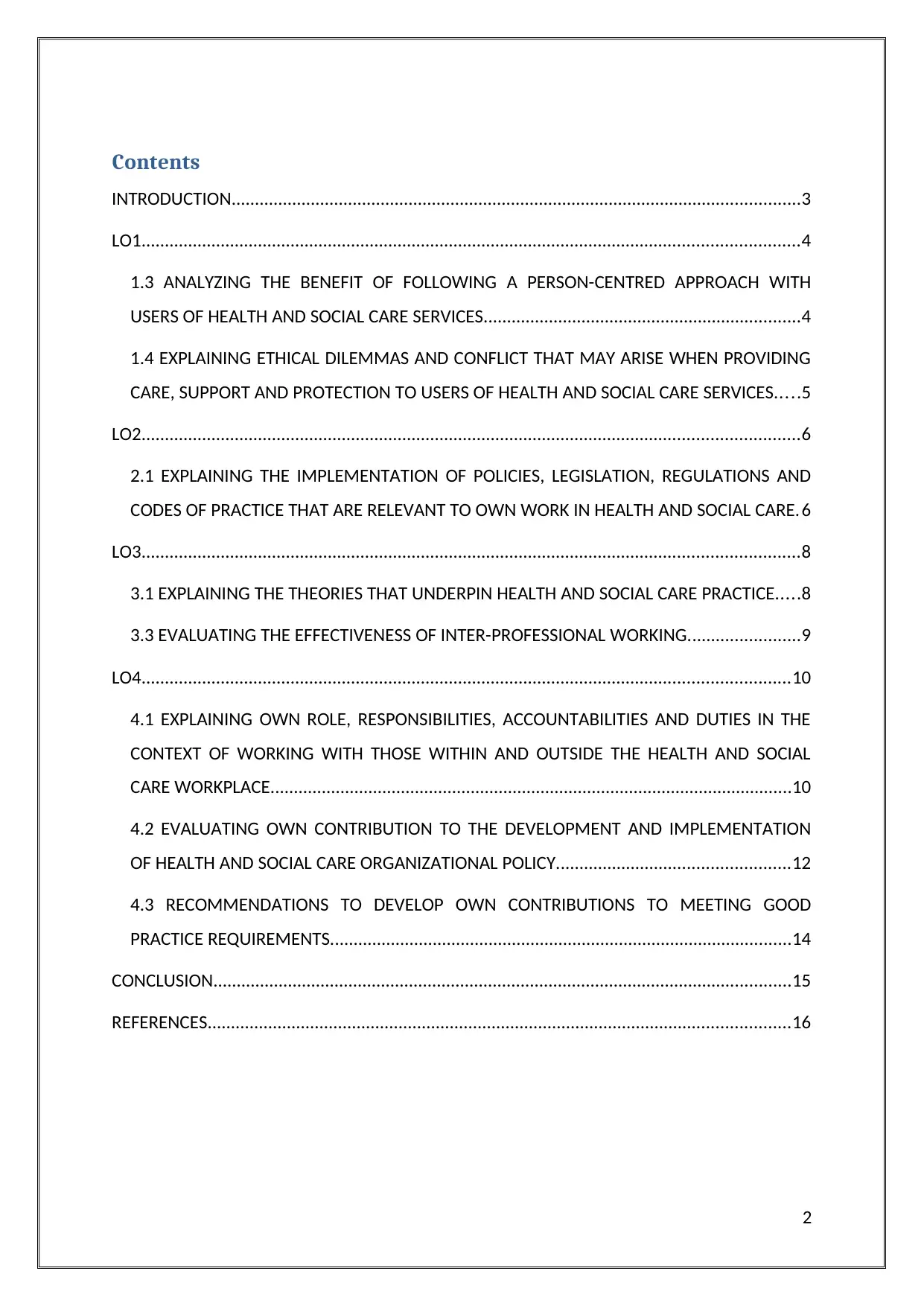
Contents
INTRODUCTION..........................................................................................................................3
LO1.............................................................................................................................................4
1.3 ANALYZING THE BENEFIT OF FOLLOWING A PERSON-CENTRED APPROACH WITH
USERS OF HEALTH AND SOCIAL CARE SERVICES....................................................................4
1.4 EXPLAINING ETHICAL DILEMMAS AND CONFLICT THAT MAY ARISE WHEN PROVIDING
CARE, SUPPORT AND PROTECTION TO USERS OF HEALTH AND SOCIAL CARE SERVICES.....5
LO2.............................................................................................................................................6
2.1 EXPLAINING THE IMPLEMENTATION OF POLICIES, LEGISLATION, REGULATIONS AND
CODES OF PRACTICE THAT ARE RELEVANT TO OWN WORK IN HEALTH AND SOCIAL CARE.6
LO3.............................................................................................................................................8
3.1 EXPLAINING THE THEORIES THAT UNDERPIN HEALTH AND SOCIAL CARE PRACTICE.....8
3.3 EVALUATING THE EFFECTIVENESS OF INTER-PROFESSIONAL WORKING........................9
LO4...........................................................................................................................................10
4.1 EXPLAINING OWN ROLE, RESPONSIBILITIES, ACCOUNTABILITIES AND DUTIES IN THE
CONTEXT OF WORKING WITH THOSE WITHIN AND OUTSIDE THE HEALTH AND SOCIAL
CARE WORKPLACE................................................................................................................10
4.2 EVALUATING OWN CONTRIBUTION TO THE DEVELOPMENT AND IMPLEMENTATION
OF HEALTH AND SOCIAL CARE ORGANIZATIONAL POLICY..................................................12
4.3 RECOMMENDATIONS TO DEVELOP OWN CONTRIBUTIONS TO MEETING GOOD
PRACTICE REQUIREMENTS...................................................................................................14
CONCLUSION............................................................................................................................15
REFERENCES.............................................................................................................................16
2
INTRODUCTION..........................................................................................................................3
LO1.............................................................................................................................................4
1.3 ANALYZING THE BENEFIT OF FOLLOWING A PERSON-CENTRED APPROACH WITH
USERS OF HEALTH AND SOCIAL CARE SERVICES....................................................................4
1.4 EXPLAINING ETHICAL DILEMMAS AND CONFLICT THAT MAY ARISE WHEN PROVIDING
CARE, SUPPORT AND PROTECTION TO USERS OF HEALTH AND SOCIAL CARE SERVICES.....5
LO2.............................................................................................................................................6
2.1 EXPLAINING THE IMPLEMENTATION OF POLICIES, LEGISLATION, REGULATIONS AND
CODES OF PRACTICE THAT ARE RELEVANT TO OWN WORK IN HEALTH AND SOCIAL CARE.6
LO3.............................................................................................................................................8
3.1 EXPLAINING THE THEORIES THAT UNDERPIN HEALTH AND SOCIAL CARE PRACTICE.....8
3.3 EVALUATING THE EFFECTIVENESS OF INTER-PROFESSIONAL WORKING........................9
LO4...........................................................................................................................................10
4.1 EXPLAINING OWN ROLE, RESPONSIBILITIES, ACCOUNTABILITIES AND DUTIES IN THE
CONTEXT OF WORKING WITH THOSE WITHIN AND OUTSIDE THE HEALTH AND SOCIAL
CARE WORKPLACE................................................................................................................10
4.2 EVALUATING OWN CONTRIBUTION TO THE DEVELOPMENT AND IMPLEMENTATION
OF HEALTH AND SOCIAL CARE ORGANIZATIONAL POLICY..................................................12
4.3 RECOMMENDATIONS TO DEVELOP OWN CONTRIBUTIONS TO MEETING GOOD
PRACTICE REQUIREMENTS...................................................................................................14
CONCLUSION............................................................................................................................15
REFERENCES.............................................................................................................................16
2
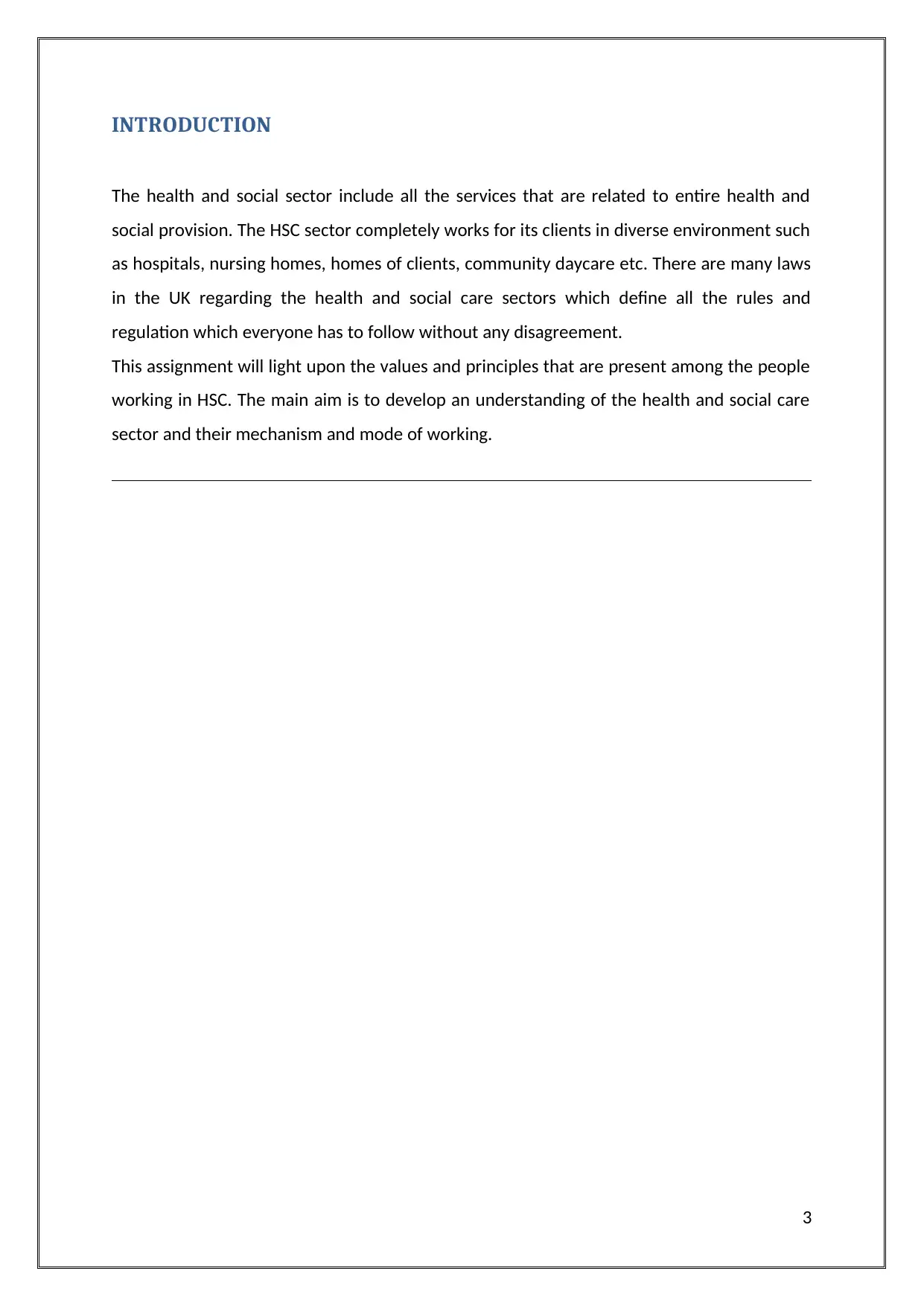
INTRODUCTION
The health and social sector include all the services that are related to entire health and
social provision. The HSC sector completely works for its clients in diverse environment such
as hospitals, nursing homes, homes of clients, community daycare etc. There are many laws
in the UK regarding the health and social care sectors which define all the rules and
regulation which everyone has to follow without any disagreement.
This assignment will light upon the values and principles that are present among the people
working in HSC. The main aim is to develop an understanding of the health and social care
sector and their mechanism and mode of working.
3
The health and social sector include all the services that are related to entire health and
social provision. The HSC sector completely works for its clients in diverse environment such
as hospitals, nursing homes, homes of clients, community daycare etc. There are many laws
in the UK regarding the health and social care sectors which define all the rules and
regulation which everyone has to follow without any disagreement.
This assignment will light upon the values and principles that are present among the people
working in HSC. The main aim is to develop an understanding of the health and social care
sector and their mechanism and mode of working.
3
⊘ This is a preview!⊘
Do you want full access?
Subscribe today to unlock all pages.

Trusted by 1+ million students worldwide
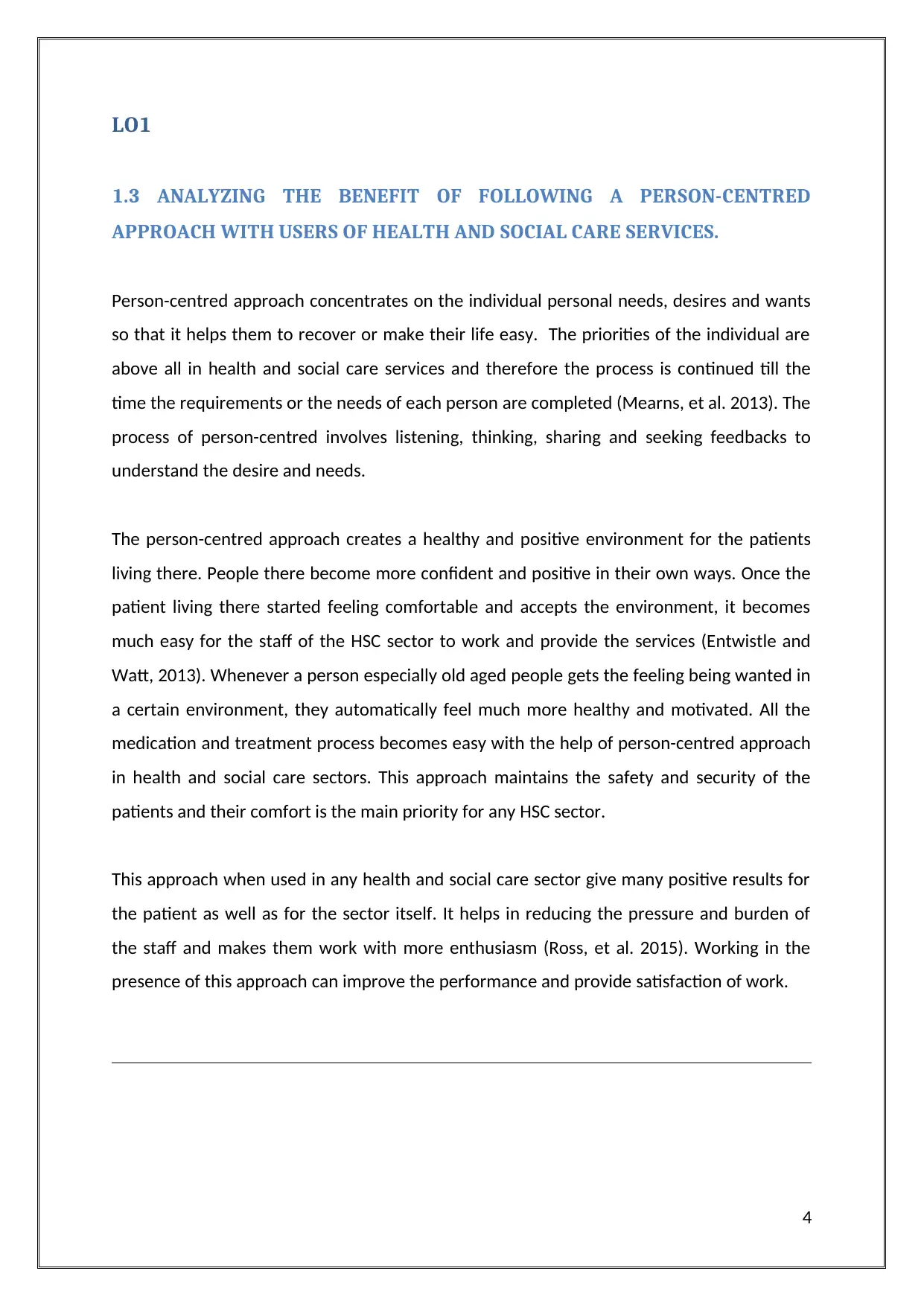
LO1
1.3 ANALYZING THE BENEFIT OF FOLLOWING A PERSON-CENTRED
APPROACH WITH USERS OF HEALTH AND SOCIAL CARE SERVICES.
Person-centred approach concentrates on the individual personal needs, desires and wants
so that it helps them to recover or make their life easy. The priorities of the individual are
above all in health and social care services and therefore the process is continued till the
time the requirements or the needs of each person are completed (Mearns, et al. 2013). The
process of person-centred involves listening, thinking, sharing and seeking feedbacks to
understand the desire and needs.
The person-centred approach creates a healthy and positive environment for the patients
living there. People there become more confident and positive in their own ways. Once the
patient living there started feeling comfortable and accepts the environment, it becomes
much easy for the staff of the HSC sector to work and provide the services (Entwistle and
Watt, 2013). Whenever a person especially old aged people gets the feeling being wanted in
a certain environment, they automatically feel much more healthy and motivated. All the
medication and treatment process becomes easy with the help of person-centred approach
in health and social care sectors. This approach maintains the safety and security of the
patients and their comfort is the main priority for any HSC sector.
This approach when used in any health and social care sector give many positive results for
the patient as well as for the sector itself. It helps in reducing the pressure and burden of
the staff and makes them work with more enthusiasm (Ross, et al. 2015). Working in the
presence of this approach can improve the performance and provide satisfaction of work.
4
1.3 ANALYZING THE BENEFIT OF FOLLOWING A PERSON-CENTRED
APPROACH WITH USERS OF HEALTH AND SOCIAL CARE SERVICES.
Person-centred approach concentrates on the individual personal needs, desires and wants
so that it helps them to recover or make their life easy. The priorities of the individual are
above all in health and social care services and therefore the process is continued till the
time the requirements or the needs of each person are completed (Mearns, et al. 2013). The
process of person-centred involves listening, thinking, sharing and seeking feedbacks to
understand the desire and needs.
The person-centred approach creates a healthy and positive environment for the patients
living there. People there become more confident and positive in their own ways. Once the
patient living there started feeling comfortable and accepts the environment, it becomes
much easy for the staff of the HSC sector to work and provide the services (Entwistle and
Watt, 2013). Whenever a person especially old aged people gets the feeling being wanted in
a certain environment, they automatically feel much more healthy and motivated. All the
medication and treatment process becomes easy with the help of person-centred approach
in health and social care sectors. This approach maintains the safety and security of the
patients and their comfort is the main priority for any HSC sector.
This approach when used in any health and social care sector give many positive results for
the patient as well as for the sector itself. It helps in reducing the pressure and burden of
the staff and makes them work with more enthusiasm (Ross, et al. 2015). Working in the
presence of this approach can improve the performance and provide satisfaction of work.
4
Paraphrase This Document
Need a fresh take? Get an instant paraphrase of this document with our AI Paraphraser
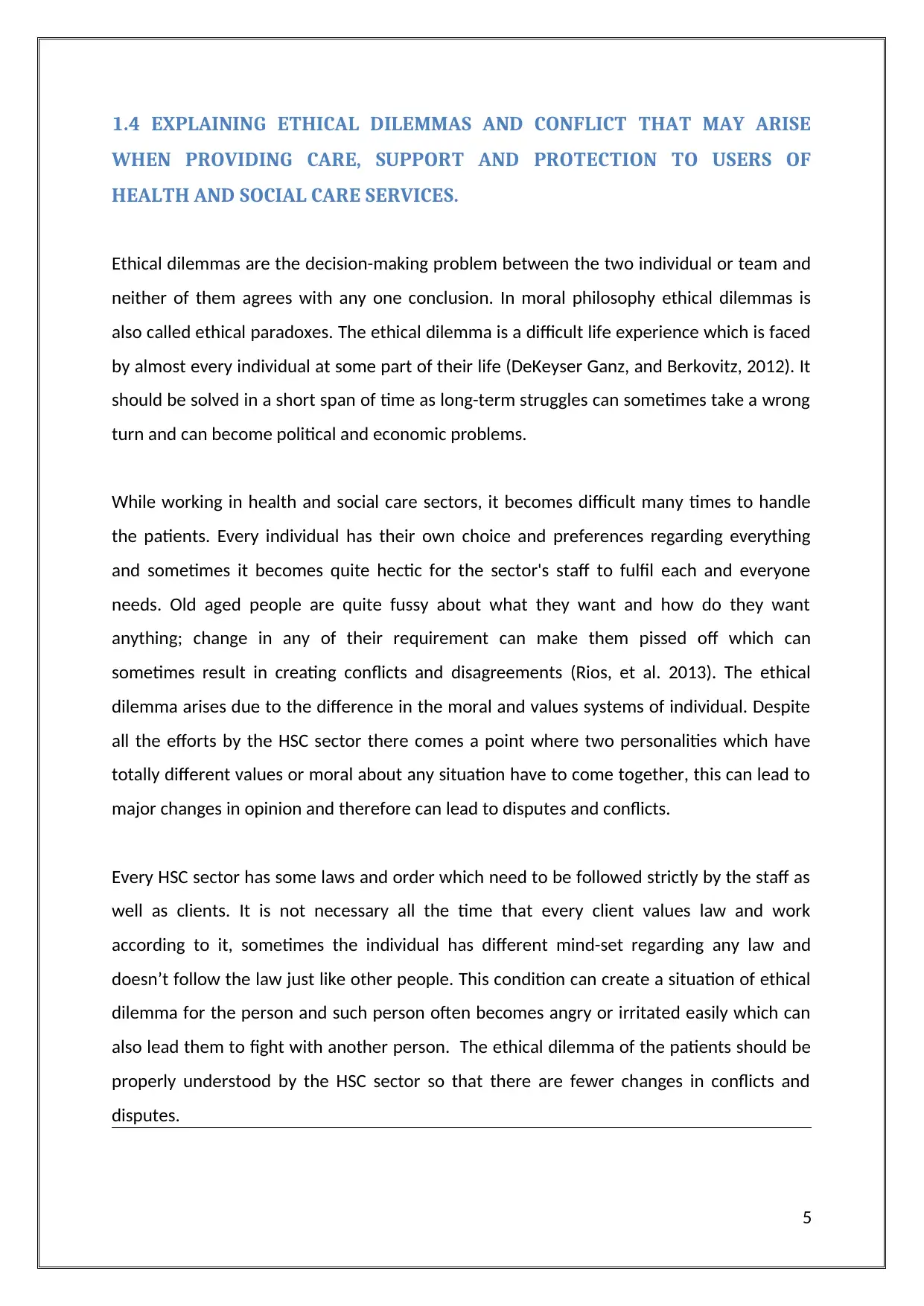
1.4 EXPLAINING ETHICAL DILEMMAS AND CONFLICT THAT MAY ARISE
WHEN PROVIDING CARE, SUPPORT AND PROTECTION TO USERS OF
HEALTH AND SOCIAL CARE SERVICES.
Ethical dilemmas are the decision-making problem between the two individual or team and
neither of them agrees with any one conclusion. In moral philosophy ethical dilemmas is
also called ethical paradoxes. The ethical dilemma is a difficult life experience which is faced
by almost every individual at some part of their life (DeKeyser Ganz, and Berkovitz, 2012). It
should be solved in a short span of time as long-term struggles can sometimes take a wrong
turn and can become political and economic problems.
While working in health and social care sectors, it becomes difficult many times to handle
the patients. Every individual has their own choice and preferences regarding everything
and sometimes it becomes quite hectic for the sector's staff to fulfil each and everyone
needs. Old aged people are quite fussy about what they want and how do they want
anything; change in any of their requirement can make them pissed off which can
sometimes result in creating conflicts and disagreements (Rios, et al. 2013). The ethical
dilemma arises due to the difference in the moral and values systems of individual. Despite
all the efforts by the HSC sector there comes a point where two personalities which have
totally different values or moral about any situation have to come together, this can lead to
major changes in opinion and therefore can lead to disputes and conflicts.
Every HSC sector has some laws and order which need to be followed strictly by the staff as
well as clients. It is not necessary all the time that every client values law and work
according to it, sometimes the individual has different mind-set regarding any law and
doesn’t follow the law just like other people. This condition can create a situation of ethical
dilemma for the person and such person often becomes angry or irritated easily which can
also lead them to fight with another person. The ethical dilemma of the patients should be
properly understood by the HSC sector so that there are fewer changes in conflicts and
disputes.
5
WHEN PROVIDING CARE, SUPPORT AND PROTECTION TO USERS OF
HEALTH AND SOCIAL CARE SERVICES.
Ethical dilemmas are the decision-making problem between the two individual or team and
neither of them agrees with any one conclusion. In moral philosophy ethical dilemmas is
also called ethical paradoxes. The ethical dilemma is a difficult life experience which is faced
by almost every individual at some part of their life (DeKeyser Ganz, and Berkovitz, 2012). It
should be solved in a short span of time as long-term struggles can sometimes take a wrong
turn and can become political and economic problems.
While working in health and social care sectors, it becomes difficult many times to handle
the patients. Every individual has their own choice and preferences regarding everything
and sometimes it becomes quite hectic for the sector's staff to fulfil each and everyone
needs. Old aged people are quite fussy about what they want and how do they want
anything; change in any of their requirement can make them pissed off which can
sometimes result in creating conflicts and disagreements (Rios, et al. 2013). The ethical
dilemma arises due to the difference in the moral and values systems of individual. Despite
all the efforts by the HSC sector there comes a point where two personalities which have
totally different values or moral about any situation have to come together, this can lead to
major changes in opinion and therefore can lead to disputes and conflicts.
Every HSC sector has some laws and order which need to be followed strictly by the staff as
well as clients. It is not necessary all the time that every client values law and work
according to it, sometimes the individual has different mind-set regarding any law and
doesn’t follow the law just like other people. This condition can create a situation of ethical
dilemma for the person and such person often becomes angry or irritated easily which can
also lead them to fight with another person. The ethical dilemma of the patients should be
properly understood by the HSC sector so that there are fewer changes in conflicts and
disputes.
5
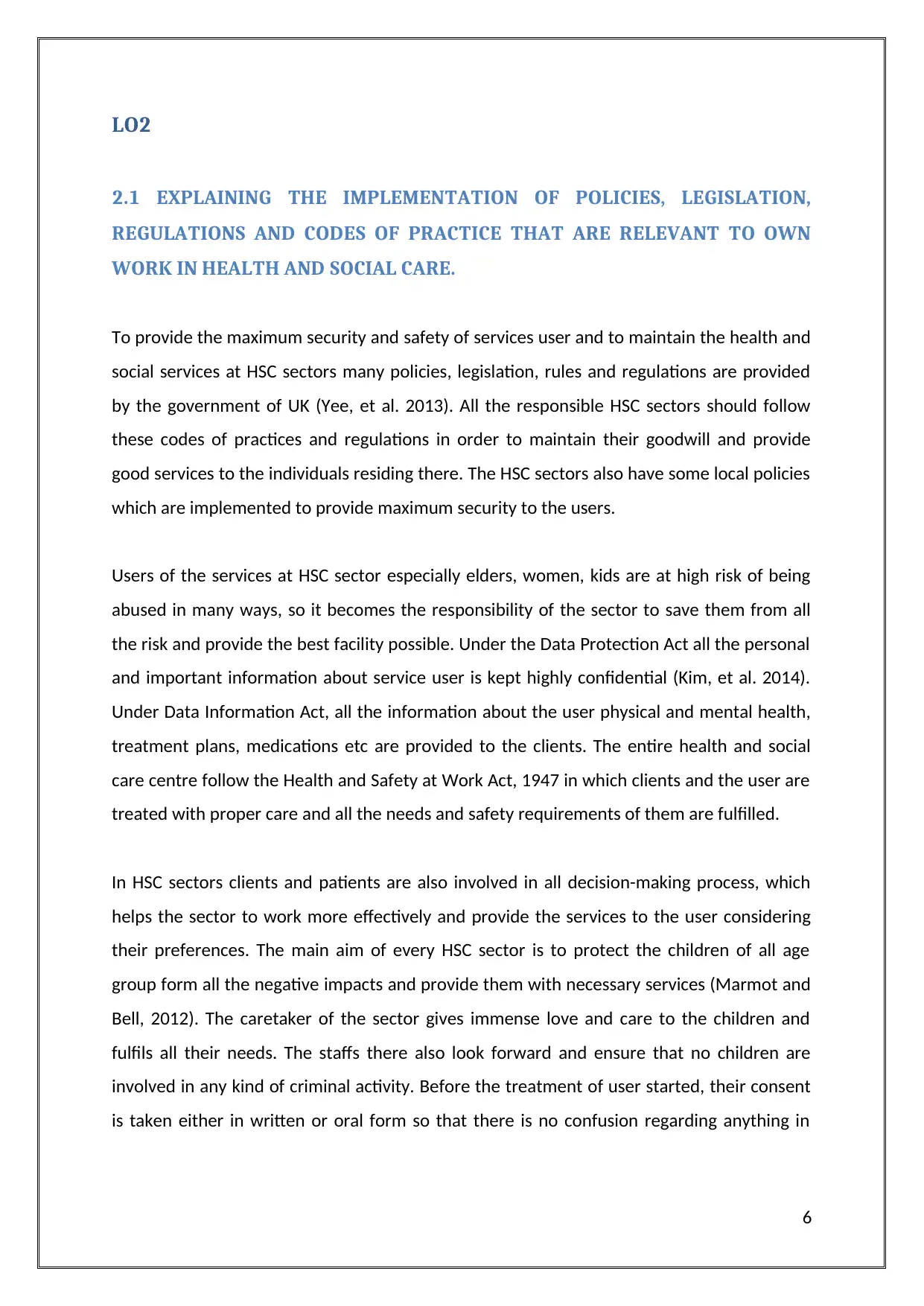
LO2
2.1 EXPLAINING THE IMPLEMENTATION OF POLICIES, LEGISLATION,
REGULATIONS AND CODES OF PRACTICE THAT ARE RELEVANT TO OWN
WORK IN HEALTH AND SOCIAL CARE.
To provide the maximum security and safety of services user and to maintain the health and
social services at HSC sectors many policies, legislation, rules and regulations are provided
by the government of UK (Yee, et al. 2013). All the responsible HSC sectors should follow
these codes of practices and regulations in order to maintain their goodwill and provide
good services to the individuals residing there. The HSC sectors also have some local policies
which are implemented to provide maximum security to the users.
Users of the services at HSC sector especially elders, women, kids are at high risk of being
abused in many ways, so it becomes the responsibility of the sector to save them from all
the risk and provide the best facility possible. Under the Data Protection Act all the personal
and important information about service user is kept highly confidential (Kim, et al. 2014).
Under Data Information Act, all the information about the user physical and mental health,
treatment plans, medications etc are provided to the clients. The entire health and social
care centre follow the Health and Safety at Work Act, 1947 in which clients and the user are
treated with proper care and all the needs and safety requirements of them are fulfilled.
In HSC sectors clients and patients are also involved in all decision-making process, which
helps the sector to work more effectively and provide the services to the user considering
their preferences. The main aim of every HSC sector is to protect the children of all age
group form all the negative impacts and provide them with necessary services (Marmot and
Bell, 2012). The caretaker of the sector gives immense love and care to the children and
fulfils all their needs. The staffs there also look forward and ensure that no children are
involved in any kind of criminal activity. Before the treatment of user started, their consent
is taken either in written or oral form so that there is no confusion regarding anything in
6
2.1 EXPLAINING THE IMPLEMENTATION OF POLICIES, LEGISLATION,
REGULATIONS AND CODES OF PRACTICE THAT ARE RELEVANT TO OWN
WORK IN HEALTH AND SOCIAL CARE.
To provide the maximum security and safety of services user and to maintain the health and
social services at HSC sectors many policies, legislation, rules and regulations are provided
by the government of UK (Yee, et al. 2013). All the responsible HSC sectors should follow
these codes of practices and regulations in order to maintain their goodwill and provide
good services to the individuals residing there. The HSC sectors also have some local policies
which are implemented to provide maximum security to the users.
Users of the services at HSC sector especially elders, women, kids are at high risk of being
abused in many ways, so it becomes the responsibility of the sector to save them from all
the risk and provide the best facility possible. Under the Data Protection Act all the personal
and important information about service user is kept highly confidential (Kim, et al. 2014).
Under Data Information Act, all the information about the user physical and mental health,
treatment plans, medications etc are provided to the clients. The entire health and social
care centre follow the Health and Safety at Work Act, 1947 in which clients and the user are
treated with proper care and all the needs and safety requirements of them are fulfilled.
In HSC sectors clients and patients are also involved in all decision-making process, which
helps the sector to work more effectively and provide the services to the user considering
their preferences. The main aim of every HSC sector is to protect the children of all age
group form all the negative impacts and provide them with necessary services (Marmot and
Bell, 2012). The caretaker of the sector gives immense love and care to the children and
fulfils all their needs. The staffs there also look forward and ensure that no children are
involved in any kind of criminal activity. Before the treatment of user started, their consent
is taken either in written or oral form so that there is no confusion regarding anything in
6
⊘ This is a preview!⊘
Do you want full access?
Subscribe today to unlock all pages.

Trusted by 1+ million students worldwide
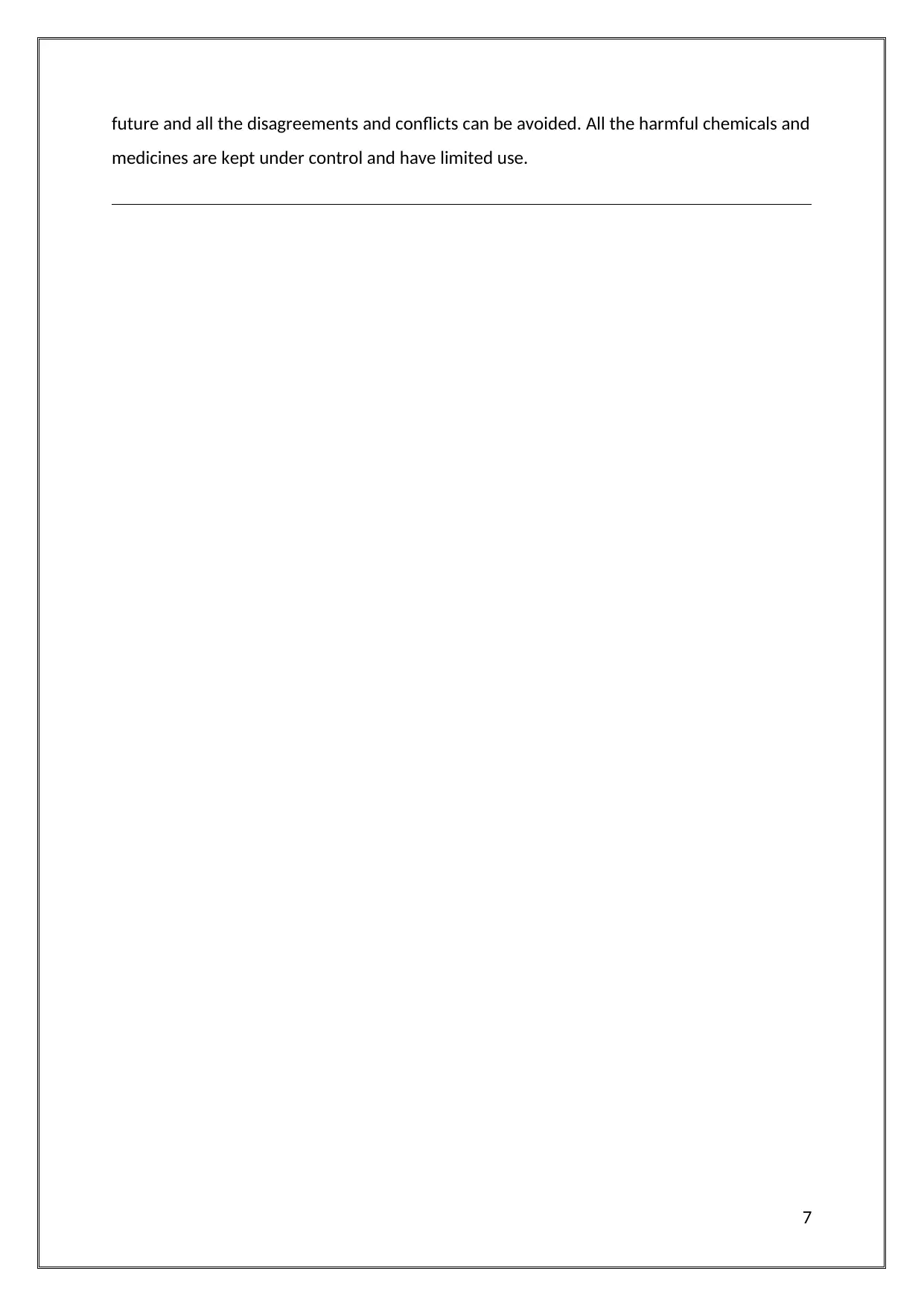
future and all the disagreements and conflicts can be avoided. All the harmful chemicals and
medicines are kept under control and have limited use.
7
medicines are kept under control and have limited use.
7
Paraphrase This Document
Need a fresh take? Get an instant paraphrase of this document with our AI Paraphraser
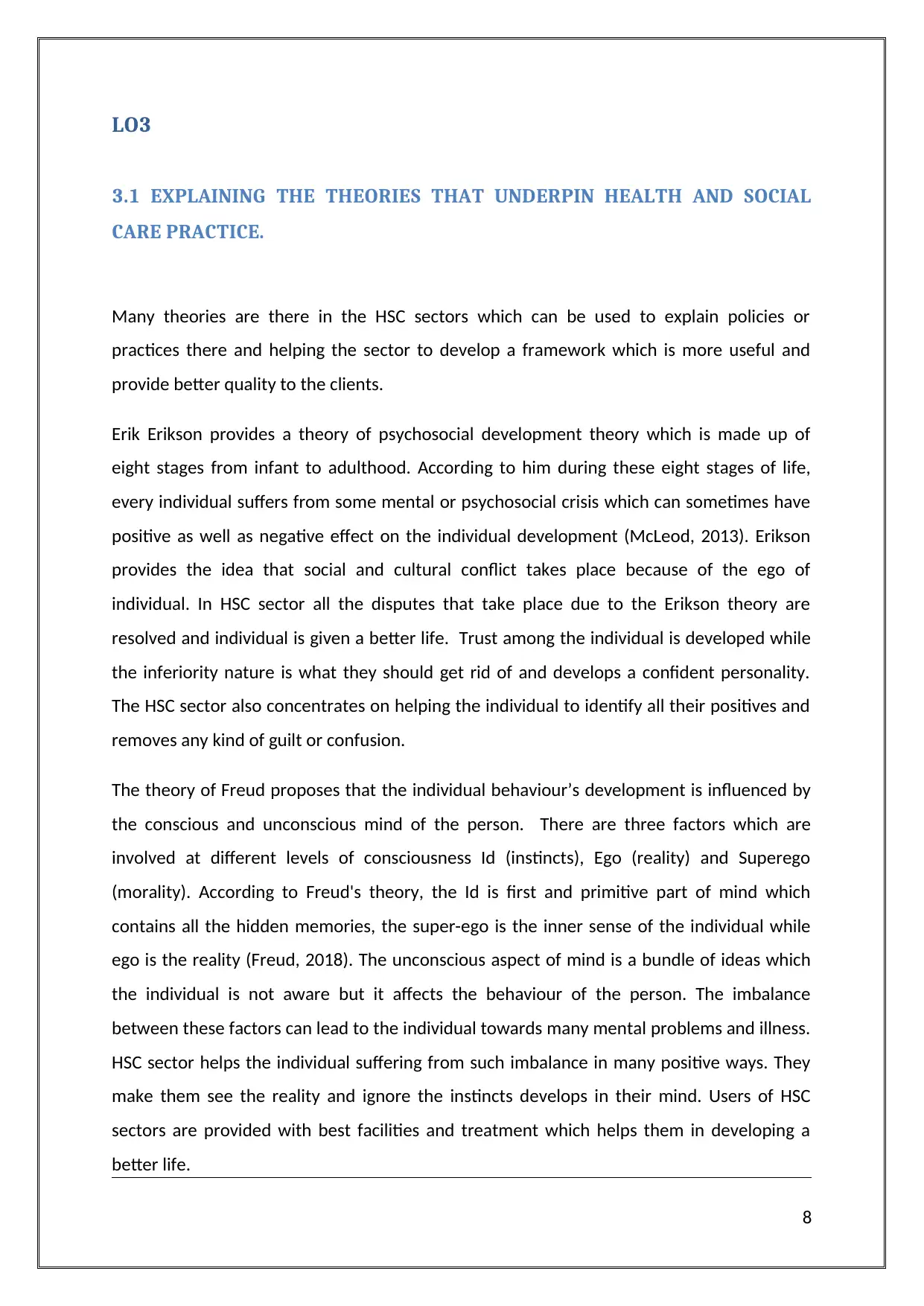
LO3
3.1 EXPLAINING THE THEORIES THAT UNDERPIN HEALTH AND SOCIAL
CARE PRACTICE.
Many theories are there in the HSC sectors which can be used to explain policies or
practices there and helping the sector to develop a framework which is more useful and
provide better quality to the clients.
Erik Erikson provides a theory of psychosocial development theory which is made up of
eight stages from infant to adulthood. According to him during these eight stages of life,
every individual suffers from some mental or psychosocial crisis which can sometimes have
positive as well as negative effect on the individual development (McLeod, 2013). Erikson
provides the idea that social and cultural conflict takes place because of the ego of
individual. In HSC sector all the disputes that take place due to the Erikson theory are
resolved and individual is given a better life. Trust among the individual is developed while
the inferiority nature is what they should get rid of and develops a confident personality.
The HSC sector also concentrates on helping the individual to identify all their positives and
removes any kind of guilt or confusion.
The theory of Freud proposes that the individual behaviour’s development is influenced by
the conscious and unconscious mind of the person. There are three factors which are
involved at different levels of consciousness Id (instincts), Ego (reality) and Superego
(morality). According to Freud's theory, the Id is first and primitive part of mind which
contains all the hidden memories, the super-ego is the inner sense of the individual while
ego is the reality (Freud, 2018). The unconscious aspect of mind is a bundle of ideas which
the individual is not aware but it affects the behaviour of the person. The imbalance
between these factors can lead to the individual towards many mental problems and illness.
HSC sector helps the individual suffering from such imbalance in many positive ways. They
make them see the reality and ignore the instincts develops in their mind. Users of HSC
sectors are provided with best facilities and treatment which helps them in developing a
better life.
8
3.1 EXPLAINING THE THEORIES THAT UNDERPIN HEALTH AND SOCIAL
CARE PRACTICE.
Many theories are there in the HSC sectors which can be used to explain policies or
practices there and helping the sector to develop a framework which is more useful and
provide better quality to the clients.
Erik Erikson provides a theory of psychosocial development theory which is made up of
eight stages from infant to adulthood. According to him during these eight stages of life,
every individual suffers from some mental or psychosocial crisis which can sometimes have
positive as well as negative effect on the individual development (McLeod, 2013). Erikson
provides the idea that social and cultural conflict takes place because of the ego of
individual. In HSC sector all the disputes that take place due to the Erikson theory are
resolved and individual is given a better life. Trust among the individual is developed while
the inferiority nature is what they should get rid of and develops a confident personality.
The HSC sector also concentrates on helping the individual to identify all their positives and
removes any kind of guilt or confusion.
The theory of Freud proposes that the individual behaviour’s development is influenced by
the conscious and unconscious mind of the person. There are three factors which are
involved at different levels of consciousness Id (instincts), Ego (reality) and Superego
(morality). According to Freud's theory, the Id is first and primitive part of mind which
contains all the hidden memories, the super-ego is the inner sense of the individual while
ego is the reality (Freud, 2018). The unconscious aspect of mind is a bundle of ideas which
the individual is not aware but it affects the behaviour of the person. The imbalance
between these factors can lead to the individual towards many mental problems and illness.
HSC sector helps the individual suffering from such imbalance in many positive ways. They
make them see the reality and ignore the instincts develops in their mind. Users of HSC
sectors are provided with best facilities and treatment which helps them in developing a
better life.
8
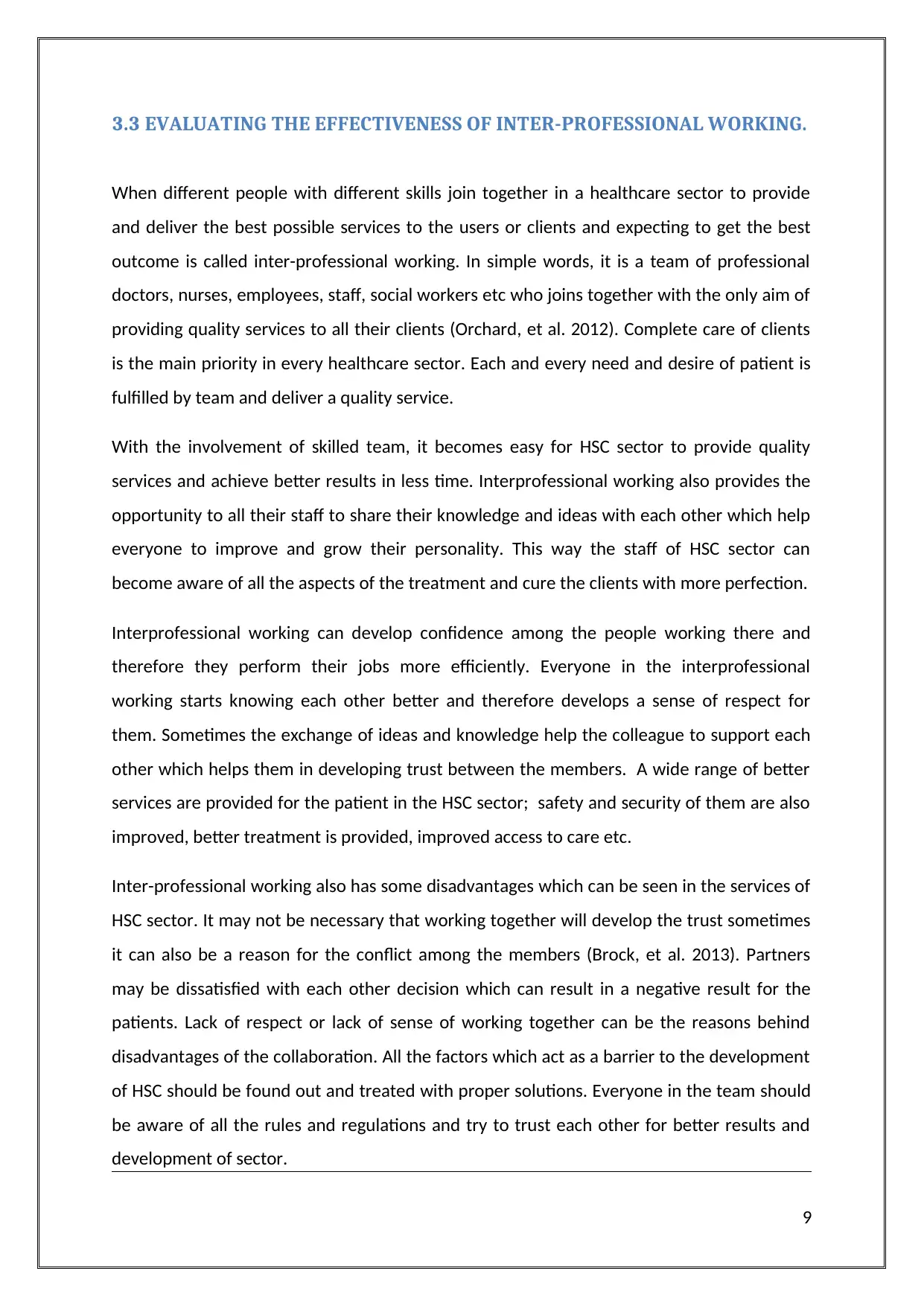
3.3 EVALUATING THE EFFECTIVENESS OF INTER-PROFESSIONAL WORKING.
When different people with different skills join together in a healthcare sector to provide
and deliver the best possible services to the users or clients and expecting to get the best
outcome is called inter-professional working. In simple words, it is a team of professional
doctors, nurses, employees, staff, social workers etc who joins together with the only aim of
providing quality services to all their clients (Orchard, et al. 2012). Complete care of clients
is the main priority in every healthcare sector. Each and every need and desire of patient is
fulfilled by team and deliver a quality service.
With the involvement of skilled team, it becomes easy for HSC sector to provide quality
services and achieve better results in less time. Interprofessional working also provides the
opportunity to all their staff to share their knowledge and ideas with each other which help
everyone to improve and grow their personality. This way the staff of HSC sector can
become aware of all the aspects of the treatment and cure the clients with more perfection.
Interprofessional working can develop confidence among the people working there and
therefore they perform their jobs more efficiently. Everyone in the interprofessional
working starts knowing each other better and therefore develops a sense of respect for
them. Sometimes the exchange of ideas and knowledge help the colleague to support each
other which helps them in developing trust between the members. A wide range of better
services are provided for the patient in the HSC sector; safety and security of them are also
improved, better treatment is provided, improved access to care etc.
Inter-professional working also has some disadvantages which can be seen in the services of
HSC sector. It may not be necessary that working together will develop the trust sometimes
it can also be a reason for the conflict among the members (Brock, et al. 2013). Partners
may be dissatisfied with each other decision which can result in a negative result for the
patients. Lack of respect or lack of sense of working together can be the reasons behind
disadvantages of the collaboration. All the factors which act as a barrier to the development
of HSC should be found out and treated with proper solutions. Everyone in the team should
be aware of all the rules and regulations and try to trust each other for better results and
development of sector.
9
When different people with different skills join together in a healthcare sector to provide
and deliver the best possible services to the users or clients and expecting to get the best
outcome is called inter-professional working. In simple words, it is a team of professional
doctors, nurses, employees, staff, social workers etc who joins together with the only aim of
providing quality services to all their clients (Orchard, et al. 2012). Complete care of clients
is the main priority in every healthcare sector. Each and every need and desire of patient is
fulfilled by team and deliver a quality service.
With the involvement of skilled team, it becomes easy for HSC sector to provide quality
services and achieve better results in less time. Interprofessional working also provides the
opportunity to all their staff to share their knowledge and ideas with each other which help
everyone to improve and grow their personality. This way the staff of HSC sector can
become aware of all the aspects of the treatment and cure the clients with more perfection.
Interprofessional working can develop confidence among the people working there and
therefore they perform their jobs more efficiently. Everyone in the interprofessional
working starts knowing each other better and therefore develops a sense of respect for
them. Sometimes the exchange of ideas and knowledge help the colleague to support each
other which helps them in developing trust between the members. A wide range of better
services are provided for the patient in the HSC sector; safety and security of them are also
improved, better treatment is provided, improved access to care etc.
Inter-professional working also has some disadvantages which can be seen in the services of
HSC sector. It may not be necessary that working together will develop the trust sometimes
it can also be a reason for the conflict among the members (Brock, et al. 2013). Partners
may be dissatisfied with each other decision which can result in a negative result for the
patients. Lack of respect or lack of sense of working together can be the reasons behind
disadvantages of the collaboration. All the factors which act as a barrier to the development
of HSC should be found out and treated with proper solutions. Everyone in the team should
be aware of all the rules and regulations and try to trust each other for better results and
development of sector.
9
⊘ This is a preview!⊘
Do you want full access?
Subscribe today to unlock all pages.

Trusted by 1+ million students worldwide
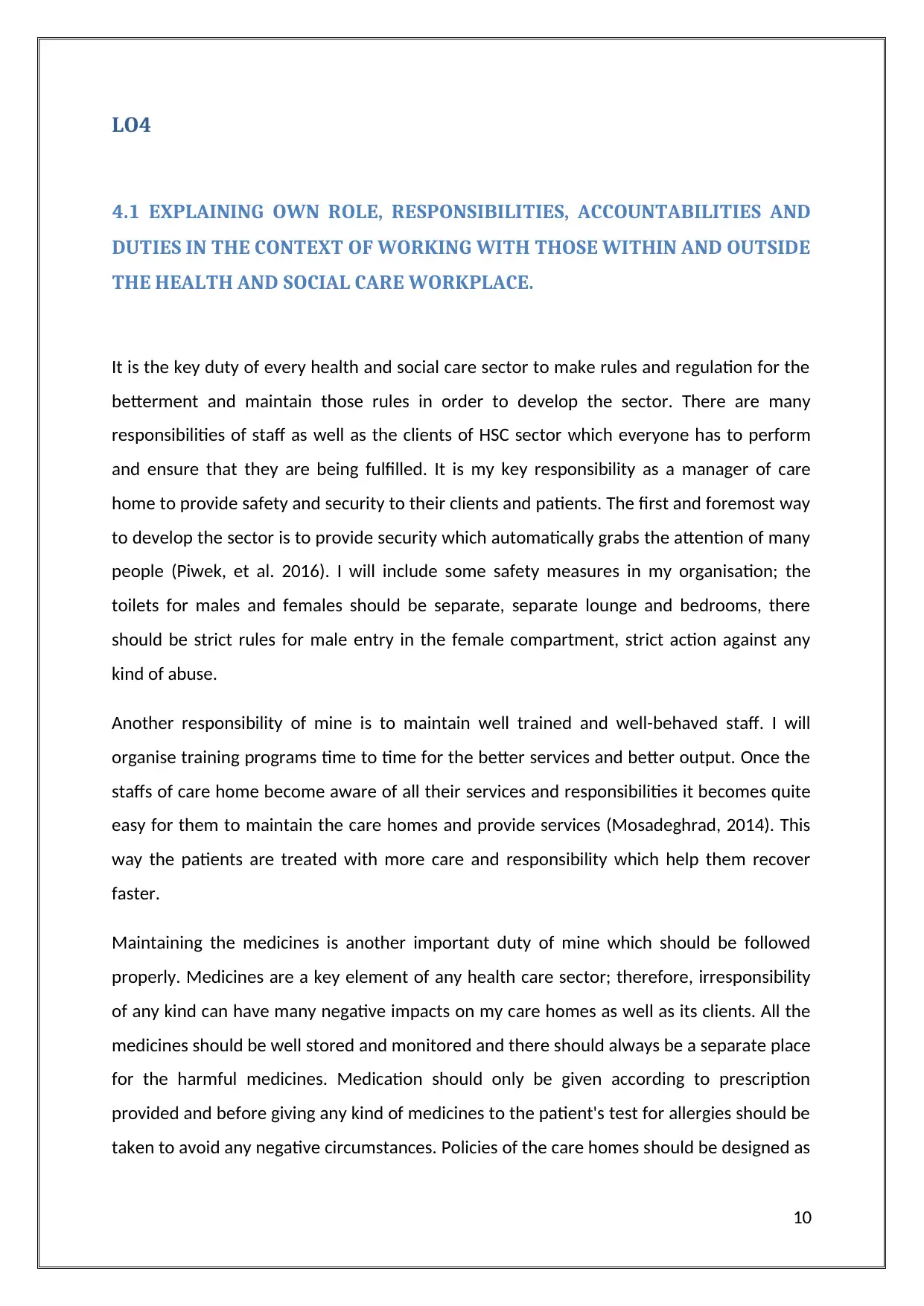
LO4
4.1 EXPLAINING OWN ROLE, RESPONSIBILITIES, ACCOUNTABILITIES AND
DUTIES IN THE CONTEXT OF WORKING WITH THOSE WITHIN AND OUTSIDE
THE HEALTH AND SOCIAL CARE WORKPLACE.
It is the key duty of every health and social care sector to make rules and regulation for the
betterment and maintain those rules in order to develop the sector. There are many
responsibilities of staff as well as the clients of HSC sector which everyone has to perform
and ensure that they are being fulfilled. It is my key responsibility as a manager of care
home to provide safety and security to their clients and patients. The first and foremost way
to develop the sector is to provide security which automatically grabs the attention of many
people (Piwek, et al. 2016). I will include some safety measures in my organisation; the
toilets for males and females should be separate, separate lounge and bedrooms, there
should be strict rules for male entry in the female compartment, strict action against any
kind of abuse.
Another responsibility of mine is to maintain well trained and well-behaved staff. I will
organise training programs time to time for the better services and better output. Once the
staffs of care home become aware of all their services and responsibilities it becomes quite
easy for them to maintain the care homes and provide services (Mosadeghrad, 2014). This
way the patients are treated with more care and responsibility which help them recover
faster.
Maintaining the medicines is another important duty of mine which should be followed
properly. Medicines are a key element of any health care sector; therefore, irresponsibility
of any kind can have many negative impacts on my care homes as well as its clients. All the
medicines should be well stored and monitored and there should always be a separate place
for the harmful medicines. Medication should only be given according to prescription
provided and before giving any kind of medicines to the patient's test for allergies should be
taken to avoid any negative circumstances. Policies of the care homes should be designed as
10
4.1 EXPLAINING OWN ROLE, RESPONSIBILITIES, ACCOUNTABILITIES AND
DUTIES IN THE CONTEXT OF WORKING WITH THOSE WITHIN AND OUTSIDE
THE HEALTH AND SOCIAL CARE WORKPLACE.
It is the key duty of every health and social care sector to make rules and regulation for the
betterment and maintain those rules in order to develop the sector. There are many
responsibilities of staff as well as the clients of HSC sector which everyone has to perform
and ensure that they are being fulfilled. It is my key responsibility as a manager of care
home to provide safety and security to their clients and patients. The first and foremost way
to develop the sector is to provide security which automatically grabs the attention of many
people (Piwek, et al. 2016). I will include some safety measures in my organisation; the
toilets for males and females should be separate, separate lounge and bedrooms, there
should be strict rules for male entry in the female compartment, strict action against any
kind of abuse.
Another responsibility of mine is to maintain well trained and well-behaved staff. I will
organise training programs time to time for the better services and better output. Once the
staffs of care home become aware of all their services and responsibilities it becomes quite
easy for them to maintain the care homes and provide services (Mosadeghrad, 2014). This
way the patients are treated with more care and responsibility which help them recover
faster.
Maintaining the medicines is another important duty of mine which should be followed
properly. Medicines are a key element of any health care sector; therefore, irresponsibility
of any kind can have many negative impacts on my care homes as well as its clients. All the
medicines should be well stored and monitored and there should always be a separate place
for the harmful medicines. Medication should only be given according to prescription
provided and before giving any kind of medicines to the patient's test for allergies should be
taken to avoid any negative circumstances. Policies of the care homes should be designed as
10
Paraphrase This Document
Need a fresh take? Get an instant paraphrase of this document with our AI Paraphraser
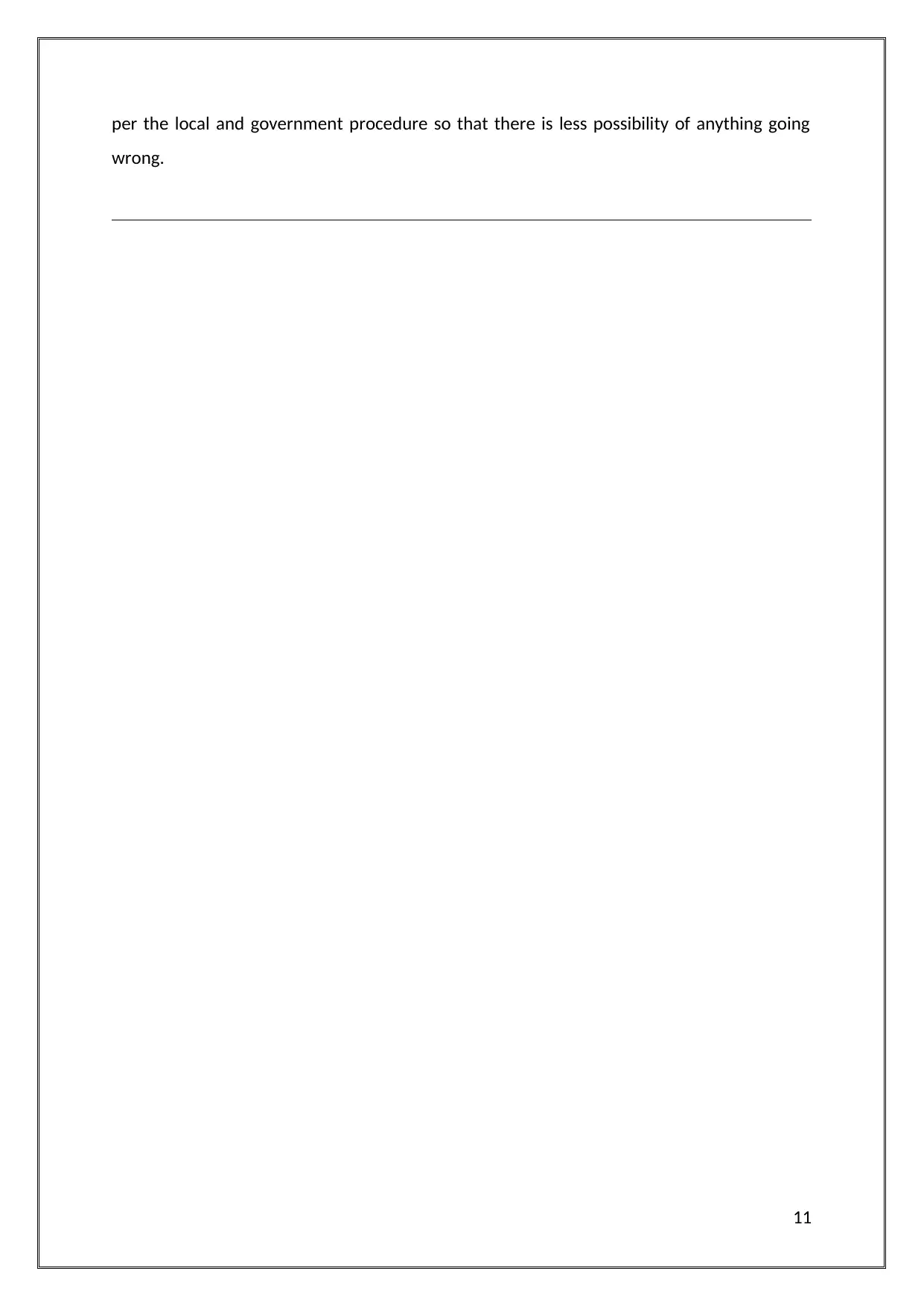
per the local and government procedure so that there is less possibility of anything going
wrong.
11
wrong.
11
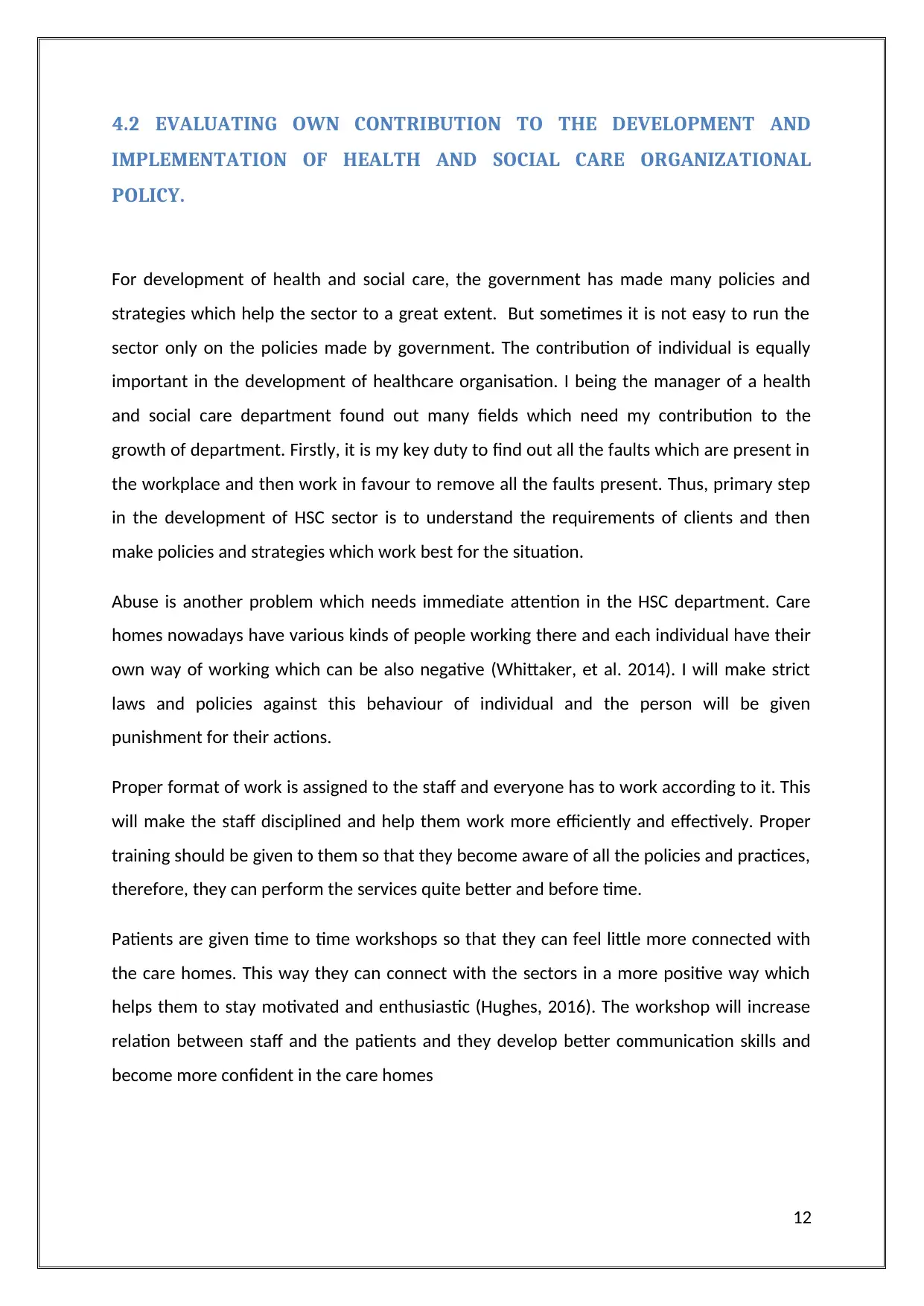
4.2 EVALUATING OWN CONTRIBUTION TO THE DEVELOPMENT AND
IMPLEMENTATION OF HEALTH AND SOCIAL CARE ORGANIZATIONAL
POLICY.
For development of health and social care, the government has made many policies and
strategies which help the sector to a great extent. But sometimes it is not easy to run the
sector only on the policies made by government. The contribution of individual is equally
important in the development of healthcare organisation. I being the manager of a health
and social care department found out many fields which need my contribution to the
growth of department. Firstly, it is my key duty to find out all the faults which are present in
the workplace and then work in favour to remove all the faults present. Thus, primary step
in the development of HSC sector is to understand the requirements of clients and then
make policies and strategies which work best for the situation.
Abuse is another problem which needs immediate attention in the HSC department. Care
homes nowadays have various kinds of people working there and each individual have their
own way of working which can be also negative (Whittaker, et al. 2014). I will make strict
laws and policies against this behaviour of individual and the person will be given
punishment for their actions.
Proper format of work is assigned to the staff and everyone has to work according to it. This
will make the staff disciplined and help them work more efficiently and effectively. Proper
training should be given to them so that they become aware of all the policies and practices,
therefore, they can perform the services quite better and before time.
Patients are given time to time workshops so that they can feel little more connected with
the care homes. This way they can connect with the sectors in a more positive way which
helps them to stay motivated and enthusiastic (Hughes, 2016). The workshop will increase
relation between staff and the patients and they develop better communication skills and
become more confident in the care homes
12
IMPLEMENTATION OF HEALTH AND SOCIAL CARE ORGANIZATIONAL
POLICY.
For development of health and social care, the government has made many policies and
strategies which help the sector to a great extent. But sometimes it is not easy to run the
sector only on the policies made by government. The contribution of individual is equally
important in the development of healthcare organisation. I being the manager of a health
and social care department found out many fields which need my contribution to the
growth of department. Firstly, it is my key duty to find out all the faults which are present in
the workplace and then work in favour to remove all the faults present. Thus, primary step
in the development of HSC sector is to understand the requirements of clients and then
make policies and strategies which work best for the situation.
Abuse is another problem which needs immediate attention in the HSC department. Care
homes nowadays have various kinds of people working there and each individual have their
own way of working which can be also negative (Whittaker, et al. 2014). I will make strict
laws and policies against this behaviour of individual and the person will be given
punishment for their actions.
Proper format of work is assigned to the staff and everyone has to work according to it. This
will make the staff disciplined and help them work more efficiently and effectively. Proper
training should be given to them so that they become aware of all the policies and practices,
therefore, they can perform the services quite better and before time.
Patients are given time to time workshops so that they can feel little more connected with
the care homes. This way they can connect with the sectors in a more positive way which
helps them to stay motivated and enthusiastic (Hughes, 2016). The workshop will increase
relation between staff and the patients and they develop better communication skills and
become more confident in the care homes
12
⊘ This is a preview!⊘
Do you want full access?
Subscribe today to unlock all pages.

Trusted by 1+ million students worldwide
1 out of 17
Related Documents
Your All-in-One AI-Powered Toolkit for Academic Success.
+13062052269
info@desklib.com
Available 24*7 on WhatsApp / Email
![[object Object]](/_next/static/media/star-bottom.7253800d.svg)
Unlock your academic potential
Copyright © 2020–2025 A2Z Services. All Rights Reserved. Developed and managed by ZUCOL.




